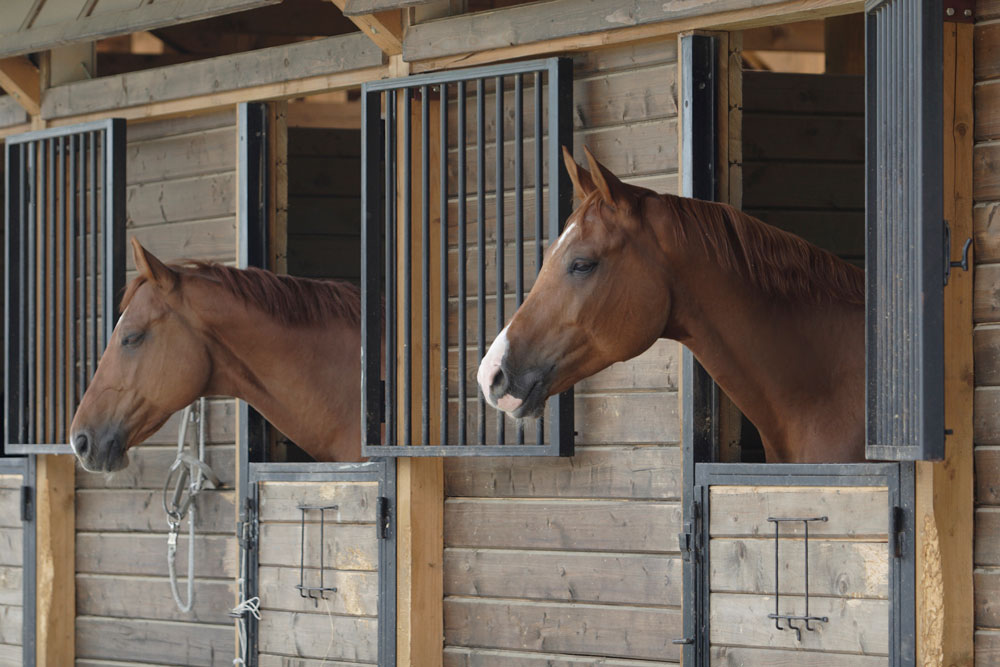Written by Mark DePaolo, DVM. COPYRIGHT © 2012 All rights reserved.
What are the most common stressors for horses?
A horse with absolutely no gastrointestinal ulceration can develop ulcers very quickly when subjected to physical stressors. This is especially prevalent when they are also being treated with Non-Steroidal Anti-Inflammatory (NSAID) drugs, such as bute or Banamine, to prevent musculoskeletal pain. Extreme exercise also causes the body to increase the amount the acid produced. One form of extreme exercise is trailering over long distances. In addition, extended trail rides, hauling or training sessions may significantly delay the feeding schedule, allowing acid to build up. Many of the ‘training’ issues seen in our horses today are merely side effects of undiagnosed and untreated gastrointestinal ulcers.

It is always important to remember that if your horse is sedated, given vaccines, antibiotics, or NSAIDs (bute, banamine), their gut flora will be temporarily negatively affected. It is imperative to provide digestive support in the form of pro-biotics, pre-biotics, digestive conditioners and/or drug therapies in order to avoid ulcers, colic or any other form of digestive distress.
Key causes of digestive distress:
- Twice daily feeding
- Hay as the main forage
- Large amounts of grain at one time
- Abrupt changes in feed
- Extreme exercise
- Long trailer rides
- NSAIDSs (Bute, Banamine)
- Antibiotics
- Daily dewormers
- Vaccinations
What are emotional stressors?
As prey animals, horses are hard-wired with a fight or flight nervous system. When the horse reacts to psychological stress, the body increases the amount of stomach acid produced. Many horses are uncomfortable with a confinement lifestyle. Stalls limit their exercise and the ability to flee or see what is beyond the walls of the barn. Horses that have limited turnout due to an injury may also become psychologically distressed.

As herd animals they are highly dependent on positive and reliable social interactions with other horses. In a study by the College of Veterinary Medicine at Iowa State University, 7 out of 10 horses that did not have ulcers, who were hauled to a new location with new pasture mates developed ulcers in less than a week. Their level of daily exercise was similar to what is typical for recreational riding.
This research affirms that re-establishing herd hierarchy and hauling may be enough to cause your horse significant digestive distress.
Stress triggers, which increase acid production are:
- Changes in herd hierarchy/social interactions
- Changes in stabling location or routines
- Confinement lifestyles with little turnout
- Traveling
- Beginning Training or changes in daily exercise routine
- Injury and confinement
- Competition
"Ulcers have become extremely prevalent in
today's horse. To combat stressful conditions,
I created Excel to promote health throughout
the entire digestive tract."
- Mark DePaolo, DVM
How can I diagnose ulcers in my horse?
There are three ways to further investigate the likelihood that your horse has ulcers. A great first step is to perform a focused acupressure point test to determine if there is sensitivity. Another option is to perform a therapeutic trial with drug therapy and/or digestive support supplementation. The most costly procedure is to have your veterinarian perform an endoscopy.
A simple, non-invasive indicator of possible digestive tract ulceration involves palpating acupuncture points near the horse’s girth area. These points are closely associated with the digestive tract, and start just behind the withers, run down along the horse’s barrel (behind the elbow) and cross the sternum. If the horse reacts with pain or sensitivity, it is very likely that your horse has an ulcer. You may also notice a defensive or reactive response when saddling or brushing this area. Severe acidosis and un-diagnosed ulcers cause often very sensitive withers or chronic sore backs.
A therapeutic trial consists of basing your diagnosis on the results of treatment with a proper drug or effective supplement. For example, if you feed your horse a digestive health supplement for one to two weeks and see improvement in symptoms, you have correctly identified the problem. Natural digestive support supplements are a fantastic way to perform a therapeutic trial, as there are no negative side effects.
In the mid-1980’s the endoscope was developed for use in diagnosing ulcers. It is a three-meter long instrument, which is passed up the horse’s nose into its stomach. The “scope” allows the veterinarian to view the whole stomach and determine the presence of lesions in the stomach lining. Unfortunately, this procedure requires a horse to fast for 12 hours prior and have water removed for two to three hours in advance. Another detraction from utilizing this procedure is that scoping will only diagnose stomach ulcers. The instrument cannot reach the hind gut, where as recent research shows, over 44% of all horses suffer from colonic ulcers.
What are common treatments for ulcers?
It seems almost impossible that stress for most show horses could be decreased enough to treat or prevent ulcers in any but the healthiest of horses. Therefore, treatment should begin at the first sign of probable ulcers.
Drug Therapy
Once you have determined that your horse has a possible ulcer, we recommend that you treat for 10 days with an OmiprazoleTM product. It reduces acid production while neutralizing acid in the stomach and intestines. It also acts as an antacid and anti-diarrheal. Experienced compounding pharmacies are beginning to offer less expensive generic versions of this drug, so consult your veterinarian.
Digestive Support Supplements
There are several digestive tract soothing products available for daily use. Natural ingredients that are especially effective include plants/herbs (aloe vera), pre-biotics, and probiotics, which reduce inflammation and support the entire digestive tract. This kind of natural conditioner is complimentary to drug therapy and is recommended to begin on the 4th or 5th day of drug treatment. For minor cases of digestive discomfort such as intermittent diarrhea, a conditioner alone can be very effective. Make sure that your digestive conditioner does not contain ingredients like the toxic metal aluminum or bentonite clays, which include aluminum.
What is the best prevention for ulcers?
Once diagnosed and treated for ulcers, horses are at risk for re-occurrences. The first step in prevention is a change in diet. Eliminate feed concentrates (such as ‘grain’) containing high amounts of carbohydrates and sugars which cause increased levels of acid production during digestion and promote ulcer formation. Carefully transition to high fat/high fiber feeds such as rice bran and alfalfa pellets. Review the label of your concentrates to ensure a low glycemic index mix. For example: molasses, corn, oats, wheat, molasses, mill run, etc. should not be fed to horses with digestive distress.
It is very important for the horse to be able to graze throughout the day rather than only eating two times per day. If stalled, having a low quality hay or pasture grass available at all times to prevent periods of fasting, keeps excess acid from building up. Try a small mesh hay net to slow eating and keep hay in front of your horse all day.
In addition to proper nutrition, an effective daily digestive support supplement, like Excel™ is recommended to counteract stress responses. It is important to to have feed a quality nutraceutical like this to help reduce inflammation, as well as naturally soothe the ulcerated digestive tract.
Most ulcer prevention dietary supplements are not strong enough to prevent ulcers when horses are subjected to the higher stress levels associated with intense training and competing, so we strongly advocate using an Omeprazole™ product for a few days prior to and during the event.
This information is for educational purposes only and should not be considered as Dr. DePaolo diagnosing your horse’s health. DePaolo Equine Concepts, Inc. recommends that you consult your regular veterinarian regarding specific health concerns.
Tips for Good Digestive Tract Health
- Use a natural daily digestive support supplement like Excel™.
- Make sure your horse avoids fasting and is allowed a "grazing" diet of more frequent meals or more free choice forage. Try a small mesh haynet to slow eating and keep hay in front of your horse all day to protect against digestive distress and ulcers.
- Review the ingredients in your complete feed. Eliminate concentrates that are high in carbohydrates (grains) and sugars (molasses). Substitute with rice bran, hay cubes or alfalfa cubes/pellets.
- Add some alfalfa or stem-y hays to stimulate chewing, saliva production, and to help the horse gain weight. The calcium in alfalfa will help neutralize and acidic stomach. If you are hauling or at an event that disrupts your horse from eating for more than three to four hours, give your horse a break to eat hay/forage and drink.
- Do not feed concentrates less than four hours before or after exercise.
- Be aware of your horse's response to changes in feed, daily routine and herd interactions. Look for symptoms of ulcers and take action immediately. Consult your veterinarian for Omiprazole™ products.

